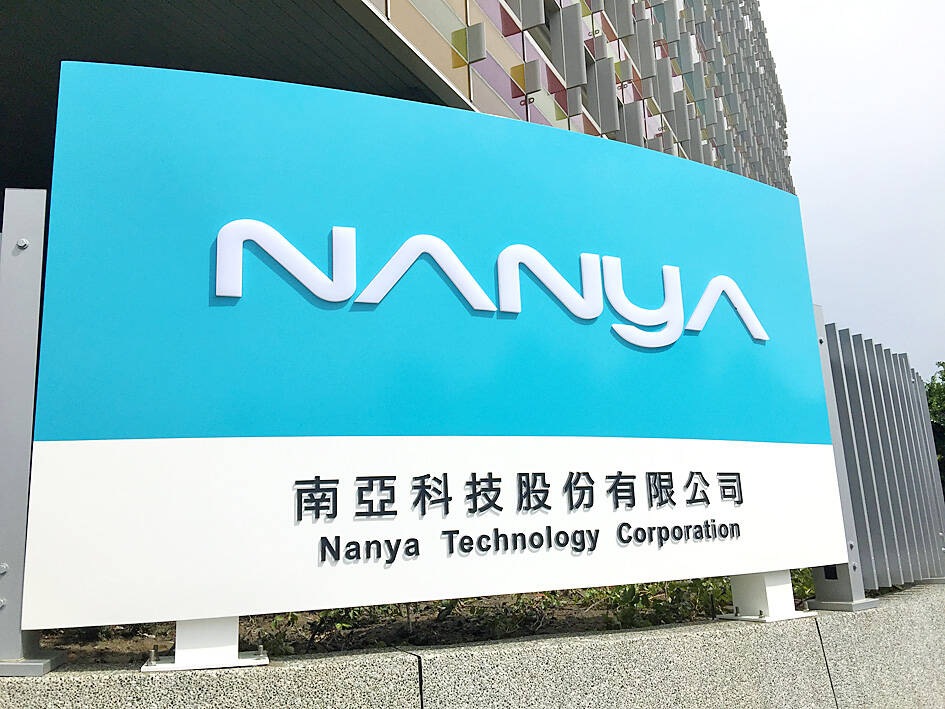Nanya Technology Corp (南亞科技) yesterday posted its ninth consecutive quarter of losses, but the world’s No. 4 DRAM chipmaker said it expects a pickup in demand next quarter for standard DRAM chips used in smartphones and consumer electronics.
The company said it has seen signs of a nascent recovery, after China introduced several economic stimulus packages to encourage consumer spending.
Major industry players, led by Samsung Electronics Co, also continue to reduce inventory, leading to better supply-demand dynamics, it said.

Photo: Grace Hung, Taipei Times
“We are expecting DRAM chips used in consumer electronics to be out of the woods in the second quarter and move toward a positive direction,” Nanya president Lee Pei-ing (李培瑛) told an online news briefing.
“The inventory of [memory chips for] smartphones is returning to a normal level in China. That will pave the way for an improvement in the supply-demand situation in the first half,” Lee said, adding that the firm expects a noticeable improvement in its bottom line in the final quarter of this year.
The company added that it is racing to produce more DDR5 DRAM chips to inject new growth. DDR5 chips, used mainly in computers and servers, enjoy a significant price premium compared with DDR4 chips.
“Nanya Technology will mainly rely on the new products — DDR5, DDR4 made on new, advanced technology, low-power DDR4 and low-power DDR5 memory chips — for bottom-line improvement, and there is a chance to see a marked improvement in the fourth quarter,” Lee said.
The company aims to boost the contribution of DDR5 chips to about 20 percent of overall DRAM production in the first half of this year.
For the full year, DDR5 chips are to account for 30 percent of its total production, Lee said.
The company has also partnered with Piecemakers Technology Inc (補丁科技) to develop high-bandwidth memory chips used in artificial intelligence-powered edge devices, Lee said, adding that it expects to ship its first high-bandwidth DRAM chips by the end of next year.
Nanya Technology last month announced that it would acquire up to 38 percent of Piecemakers’ shares for a maximum of NT$660 million (US$19.93 million), and spend NT$20 billion on new facilities and equipment this year, up from NT$16 billion last year.
The company’s net losses widened from NT$1.49 billion the previous quarter to NT$1.57 billion in the December quarter, amid sluggish demand and lower average selling prices.
On an annual basis, net losses improved from NT$2.48 billion.
Shipments last quarter sank 7 to 9 percent sequentially, or 31 to 33 percent annually, while selling prices dipped about 11 to 13 percent quarterly, but rose 11 to 13 percent annually, the company said.
As a whole, losses last year narrowed from NT$7.44 billion in 2023 to NT$5.08 billion, the company said.

Application-specific integrated circuit designer Faraday Technology Corp (智原) yesterday said that although revenue this quarter would decline 30 percent from last quarter, it retained its full-year forecast of revenue growth of 100 percent. The company attributed the quarterly drop to a slowdown in customers’ production of chips using Faraday’s advanced packaging technology. The company is still confident about its revenue growth this year, given its strong “design-win” — or the projects it won to help customers design their chips, Faraday president Steve Wang (王國雍) told an online earnings conference. “The design-win this year is better than we expected. We believe we will win

Intel Corp chief executive officer Lip-Bu Tan (陳立武) is expected to meet with Taiwanese suppliers next month in conjunction with the opening of the Computex Taipei trade show, supply chain sources said on Monday. The visit, the first for Tan to Taiwan since assuming his new post last month, would be aimed at enhancing Intel’s ties with suppliers in Taiwan as he attempts to help turn around the struggling US chipmaker, the sources said. Tan is to hold a banquet to celebrate Intel’s 40-year presence in Taiwan before Computex opens on May 20 and invite dozens of Taiwanese suppliers to exchange views

Chizuko Kimura has become the first female sushi chef in the world to win a Michelin star, fulfilling a promise she made to her dying husband to continue his legacy. The 54-year-old Japanese chef regained the Michelin star her late husband, Shunei Kimura, won three years ago for their Sushi Shunei restaurant in Paris. For Shunei Kimura, the star was a dream come true. However, the joy was short-lived. He died from cancer just three months later in June 2022. He was 65. The following year, the restaurant in the heart of Montmartre lost its star rating. Chizuko Kimura insisted that the new star is still down

While China’s leaders use their economic and political might to fight US President Donald Trump’s trade war “to the end,” its army of social media soldiers are embarking on a more humorous campaign online. Trump’s tariff blitz has seen Washington and Beijing impose eye-watering duties on imports from the other, fanning a standoff between the economic superpowers that has sparked global recession fears and sent markets into a tailspin. Trump says his policy is a response to years of being “ripped off” by other countries and aims to bring manufacturing to the US, forcing companies to employ US workers. However, China’s online warriors